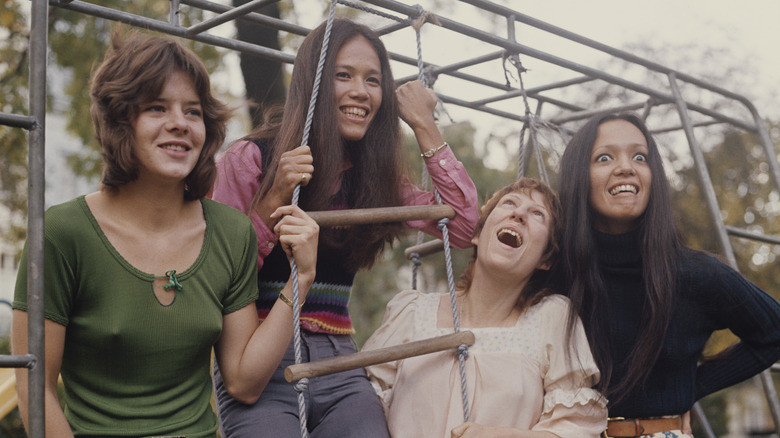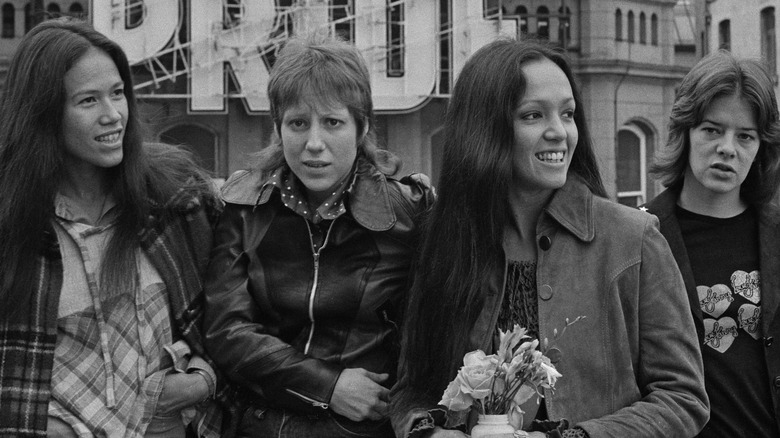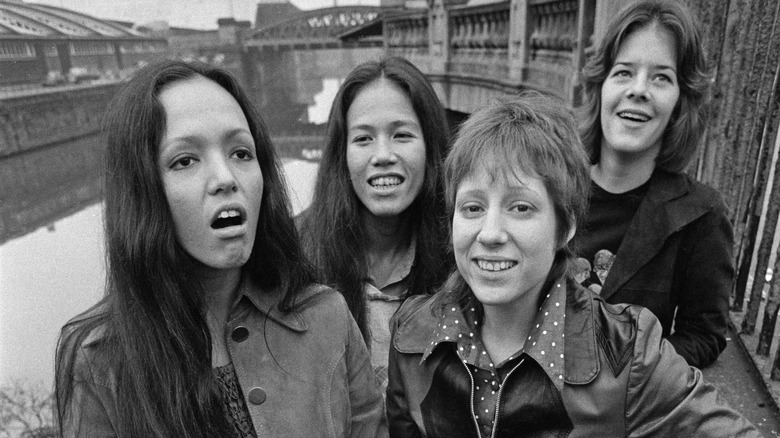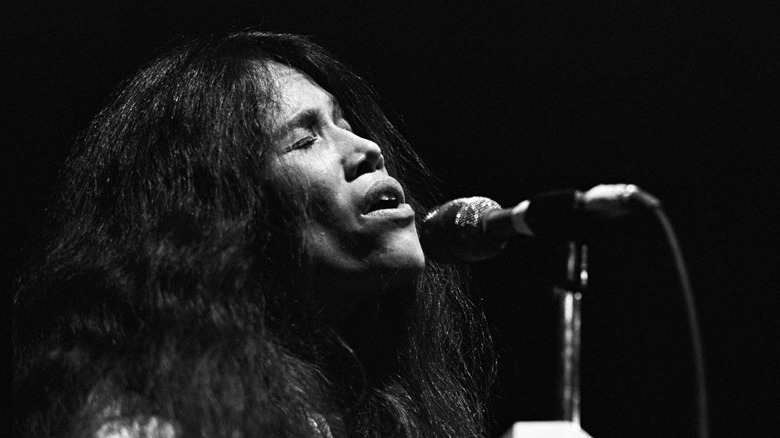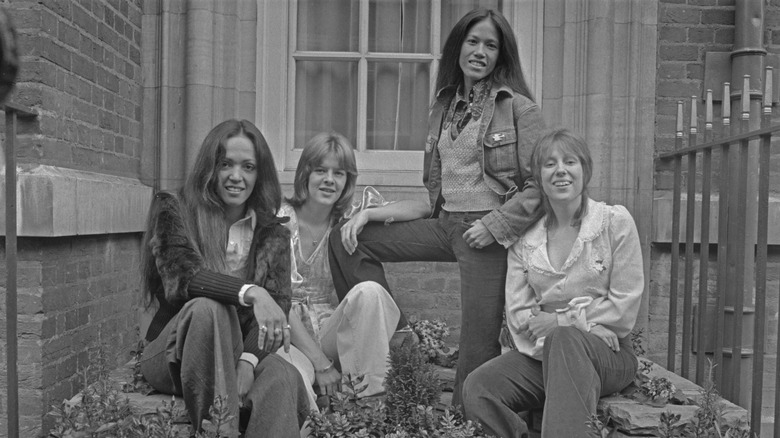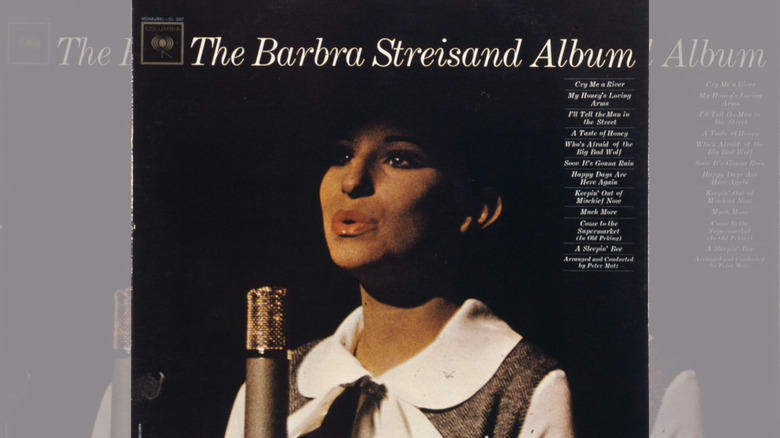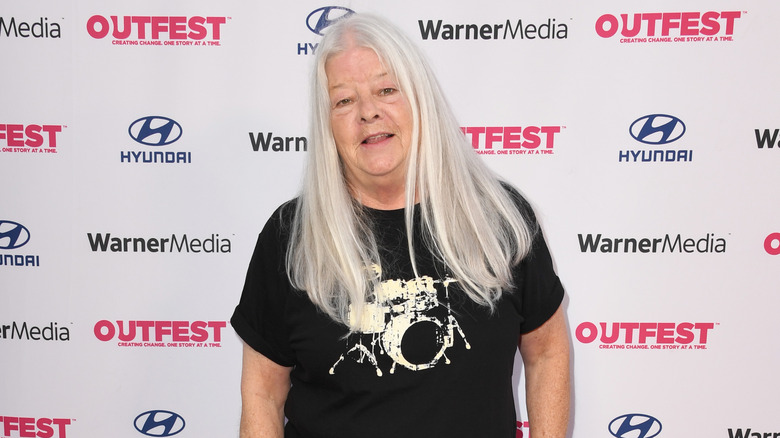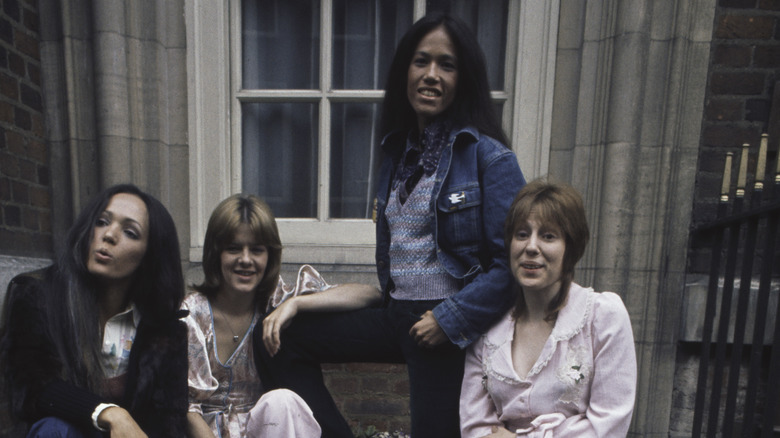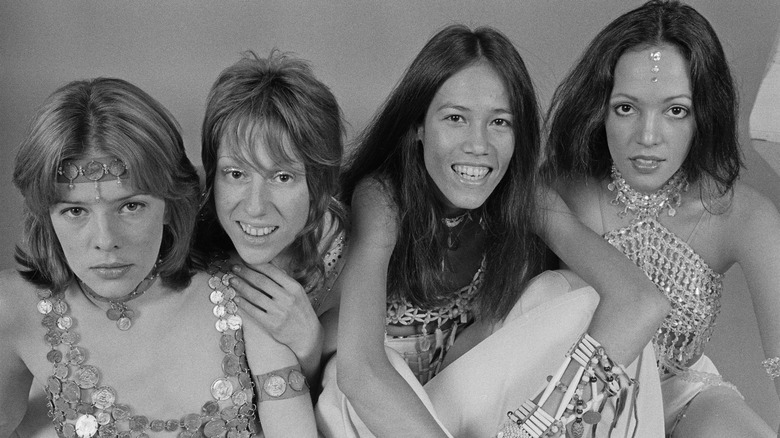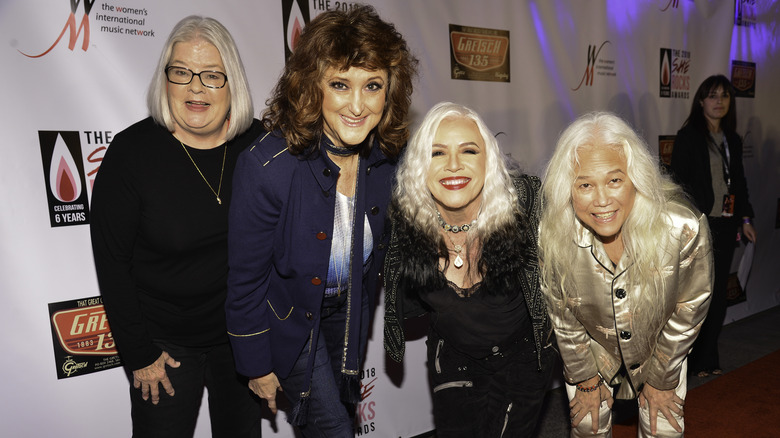Fanny: The History-Making All-Female Band You've Never Heard Of
We think of rock music as progressive and revolutionary. When it erupted into mainstream pop culture in the 1950s and 1960s, rock and roll was adopted by the burgeoning youth culture of the time. It became associated with the civil rights movement, drug culture, and the general sentiment that the times were a-changing.
But while the music might have been about freedom and revolution, the rock music industry was another matter altogether. The fact is that in the 1960s and 1970s being a woman in the rock world wasn't easy. Being in an all-girl rock band was even harder. The music business is hard enough to make a life in without tossing in extra challenges like sexism and chauvinism, which is why female rockers are survivors on top of being talented musicians.
This is why it's surprising that so few people are aware of Fanny. Not only was Fanny an all-girl rock group at a time (the early 1970s) when most rock fans and journalists didn't think women belonged in rock music, but they were also a terrific rock band that made some great music. The more you learn about Fanny the more amazed you become that their story isn't well-known to rock fans.
The band was founded by sisters
According to Rolling Stone, Fanny had its origins in the 1960s. Sisters Jean and June Millington formed a band called The Svelts in high school (along with drummer Brie Darling and guitarist Addie Lee) in the latter part of the decade. NBC News reports that the Millington sisters had been born in the Philippines to a white father serving in the US Navy and a Filipina mother. They moved to Sacramento in 1961.
Being immigrants and mixed-raced (Darling is also Filipino American), the sisters felt like outsiders. The New York Times reports that the girls experienced incessant racism as teenagers, an experience they describe as "warfare." It was a war they weren't sure they could actually win, but they found an escape in music. According to the Los Angeles Daily News, the Millington sisters had to sneak out of their house to rehearse because their father didn't approve — but their mother bought them their music gear. The Svelts was a typical high school band, playing covers of hit songs.
The band evolved into Wild Honey, which specialized in Motown covers. In these early versions, Darling handled lead vocal duties as well as drumming. They didn't think they had a future in music until their manager got them a short set at the Troubadour in West Hollywood — and they got a resoundingly positive reaction.
They were the first all-female rock band to sign with a major label
Fanny isn't just a legendary band: They literally made rock music history. While still called Wild Honey in 1969, the Los Angeles Daily News reports they played a gig at the Troubadour in West Hollywood. According to Rolling Stone, there was no reason to think this would be a history-making gig — it was "Hoot Night," an open mic event, and the band was given around five minutes to play. The audience demanded they play longer, and they caught the eye of producer Richard Perry's secretary, who arranged for them to audition. Perry was blown away — and convinced Reprise Records to sign them. The band became the first all-female rock band to sign with a major label.
Signing with a label led to a lot of changes. They changed their name from Wild Honey to Fanny, and Brie Darling and Addie Lee were replaced by drummer Alice de Buhr and keyboardist Nickey Barclay. Although their choice of band name was purposefully naughty at the time ("fanny" being a common euphemism for someone's bottom), The New York Times reports the band was shocked to discover that in England the word "fanny" is a much more intimate reference to female genitalia. That gave the new band the perfect sense of edginess for the hard-driving rock scene of the early 1970s.
Fanny released six albums
You might think that the reason you've never heard of Fanny is that they were a flash in the pan who got signed and flamed out. But the opposite is true: According to NBC News, Fanny released a total of five albums in their short, five-year career: their 1970 debut, "Fanny," followed by "Charity Ball" (1971), "Fanny Hill" (1972), "Mother's Pride" (1973), and "Rock & Roll Survivors" (1974). Not only is that a prolific amount of music in a short period of time, but Rolling Stone also notes that they worked with some heavy hitters along the way — the legendary Todd Rundgren produced "Mother's Pride," for example.
Two of those albums charted – "Charity Ball" peaked at No. 150 on the Billboard 200 in 1971, and "Fanny Hill" hit No. 135 in 1972. The band broke up in 1974 and the members all went their separate ways for more than four decades. Ultimate Classic Rock reports that after reuniting for a performance in 2016, June and Jean Millington re-formed Fanny (calling the new version of the band Fanny Walked the Earth) with drummer Brie Howard (formerly Darling) and released the album "Fanny Walked the Earth" on the independent Blue Élan Records label.
For five years Fanny was a big part of the music scene — in fact, the Los Angeles Daily News reports that Joe Elliott, lead singer for Def Leppard, still has a Fanny single that came free with a copy of a British music newspaper when he was a teenager.
They scored two Top 40 hits
Releasing an album is one thing — getting people to listen and buy records is something else altogether. But Fanny was more successful with their single releases than you might expect considering how thoroughly the music world has forgotten them.
According to Billboard, Fanny charted four singles during their career in the early 1970s — and two of those songs made it to the coveted Top 40. "Charity Ball" hit No. 40 in 1971, "Ain't That Peculiar" hit No. 85 in 1972, "I've Had It" climbed to No. 79 in 1974, and in 1975 their biggest hit came off their last album before their breakup — "Butter Boy" hit No. 29 in February of that year.
As noted by The New York Times, "Butter Boy" is a doo-wop influenced rocker inspired by David Bowie, who Jean Millington was dating at the time — although she swears it's not actually about him, despite the aggressive lyrics: "He was hard as a rock, but I was ready to roll; what a shock to find out I was in control of the situation."
Sadly, their biggest hit single came weeks after the band had already decided to break up, meaning they couldn't build on that success in any concrete way.
They toured with superstars
Despite the incessant sexism towards the band reported by Rolling Stone – solely because the male-dominated rock world didn't think female musicians could match their male counterparts — Fanny was an incredible live band. If you have any doubt about their musical chops, you can check out their live performances online and be blown away.
That musical energy and technical ability landed Fanny some choice spots touring the world. According to The New York Times, the band toured with big names like Jethro Tull, Humble Pie, The Kinks, and Slade. In fact, when touring with the legendary Deep Purple, Fanny once had to go on as headliners for a very disappointed crowd but rocked hard enough to win them over. As noted by Variety, some critics have speculated that a failure to capture their incredible live energy on their recordings may have contributed to their inability to break through to superstardom (aside from, you know, all the sexism).
Still, according to Louder, that didn't mean their live shows were seamless triumphs. Jean Millington notes that many fans showed up initially for the novelty of a rock band that was all-female, making the first 10 minutes of every show difficult to get through. Then, typically, the audience would start to realize just how good they were and get into it. Interestingly, the band's experience was completely different in Europe, where they felt audiences were much more receptive.
Fanny were in-demand session musicians
Fanny didn't coast on their novelty status: All the members of the band were serious musicians. As noted by Louder, keyboardist Nickey Barclay had even played as part of Joe Cocker's touring band prior to joining Fanny. Their technical skill with their instruments not only made them a powerful live act but also made them in-demand session musicians behind the scenes.
As reported by The Guardian, after Fanny signed with Reprise Records in the early 1970s, they were approached by Barbra Streisand. The superstar was seeking a heavier rock sound for her next album and sought out Fanny to work with her in the studio. According to the Los Angeles Daily News, Streisand worked with Fanny on her albums "Stoney End" and "Barbra Joan Streisand."
Author Angela Smith reports in her book "Women Drummers: A History from Rock and Jazz to Blues and Country" that drummer Brie Darling (who has also worked under the name Brie Brandt and is currently Brie Howard-Darling) went on to a long career as a backing and session musician, recording and touring with acts like Carole King, Elton John, and Jimmy Buffett. There's little doubt that the members of Fanny were first-class musicians.
They appeared on TV a lot
For a band so many have slept on, Fanny was actually all over the place in the 1970s. If you do a video search for the band, you'll come up with dozens and dozens of clips because they appeared on a wide variety of television shows during the course of their career.
As noted by Curve Magazine, after their debut album, "Fanny," and accompanying tour proved to skeptics that the band was the real deal, they got a bump in promotion for their follow up, "Charity Ball." That meant high-profile television appearances on shows like "The Tonight Show," "The Sonny and Cher Show," "The Midnight Special," and "American Bandstand." And Variety points out they appeared on variety shows hosted by Kenny Rogers, Dick Cavett, and Helen Reddy as well.
Their TV dominance wasn't restricted to the U.S., either. The band performed on Britain's "Old Grey Whistle Test" and appeared on the French television program "Rock en Stock," and according to I Love Classic Rock, the band performed on German television in 1972 on the program "Beat Club." It's frankly kind of amazing that the band received this kind of attention and displayed this kind of performance chops yet was still ignored for decades.
David Bowie wrote them fan letters
Fanny had a deep connection to musical superstar and rock legend David Bowie — but it almost didn't happen. According to The Guardian, in 1972 the band received a fan letter from Bowie, but they didn't know who he was and ignored it completely. Bowie persevered, inviting them to parties he was organizing, and the band hit it off. In fact, the Los Angeles Daily News reports that Bowie and Jean Millington dated for about a year — although she wound up marrying Bowie's guitarist, Earl Slick, instead.
Despite the end of that relationship, Bowie remained a huge fan of Fanny for the rest of his life. He was such a fan, in fact, that he wrote a letter to Rolling Stone in 1999 lamenting that Fanny hadn't received more attention. "They were one of the finest ... rock bands of their time," he wrote, noting that they were as important as any other rock band from the era — but it "just wasn't their time."
Millington even collaborated with Bowie. Author Benoît Clerc notes in his book "David Bowie All the Songs" that she provided background vocals on the classic song "Fame" when she just happened to drop by the studio where Bowie was working.
Members of Fanny hid their sexuality
We think of the late 1960s and early 1970s as a time of cultural change and revolution, but nothing changes all at once. While there was growing acknowledgment and support for what would become known as the LGBTQIA+ community, the Stonewall Riots had only happened a few years before Fanny's debut, and the world of rock music wasn't ready for openly homosexual artists. This was a challenge because, as reported by The New York Times, two members of Fanny were lesbians — June Millington and drummer Alice de Buhr — and The Advocate notes that Nickey Barclay was bisexual.
Millington and de Buhr were out to their bandmates and engaged in same-sex relationships, but were pressured to keep their sexuality under wraps. de Buhr, who came out at age 17 according to Gay City News, recalls telling people she had a boyfriend in order to deflect questions about her sexuality, and Millington didn't come out officially until years after the band broke up, according to The Guardian.
The sexuality of Fanny's members is more important than you might realize — although all they wanted to do was make great rock music, they also made history. As pointed out in the "Historical Dictionary of the Lesbian and Gay Liberation Movements," Fanny is known as the first "predominantly lesbian" rock band.
The band faced every kind of -ism
In a lot of ways, Fanny was way ahead of its time — and faced some serious cultural challenges. In fact, the band experienced just about every kind of prejudice someone can face in this world.
As noted by Rolling Stone, they were an all-female band, and they experienced nonstop sexism. This included club owners, record executives, and promoters assuming they were groupies or girlfriends instead of the actual band. And The New York Times reports that even when Fanny was booked for gigs they were often treated like a novelty act because they were women — and the hostility of the largely male crowds was "so palpable it was almost physical" according to June Millington.
There was pervasive racism, too; the Millington sisters were part Filipino, as was Brie Darling. According to The Guardian, the Millington sisters first experienced racism at home, where their father would often state he didn't like Filipino culture, and that Filipinos were "duplicitous." They experienced even more racism at school, where they were often mistaken for Mexicans.
The worst part about all of this is that the band felt powerless. According to NBC News, June Millington felt like there was a secret "don't ask, don't tell" policy that prevented them from ever mentioning the racism and sexism they experienced — which meant that nothing ever changed.
They switched labels to assert control
For all of Fanny's success in the early 1970s, after four albums with Reprise Records they hadn't yet experienced a breakthrough. According to The New York Times, June Millington left the band in 1973 after having what she described as a "nervous breakdown," but the band soldiered on. Reprise began pressuring them to dress in a more overtly sexy way in order to entice more male fans, and the band hated it. Alice de Buhr complained that the outfit they handed her was composed of "$45 worth of American coins, looped together" that was very revealing — and extremely uncomfortable.
Louder reports that the pressure to be sexy and submissive was constant — at one photo shoot the band was ordered to get onto their hands and knees, despite their protests. It made the band feel like Reprise had lost faith in them as musicians, and thought the only way to sell their records was through sex appeal.
The band reorganized itself without Millington and left Reprise, signing with Casablanca, where they released their final album, 1974's "Rock and Roll Survivors." This decision almost changed everything — as noted by Larry Harris in his book "And Party Every Day," the song "Butter Boy" from this album was an instant hit and seemed destined to hit the Top Five — but ironically its overtly sexual lyrics caused a backlash, and radio stations stopped playing the song. It stalled at No. 29.
Fanny still rocks
Although Fanny seemed forgotten for a long time and has never technically reformed, they've started to get the attention they deserve — and the various members are still making music together.
As reported by Rolling Stone, in 2016 a tribute concert in honor of June Millington was organized in Northampton, Massachusetts. It was the first time the Millington sisters played with Brie Darling in 35 years, and they immediately felt the same rush of excitement they'd experienced together in 1967. The trio decided to make it official and formed a new group called Fanny Walked the Earth, releasing a self-titled album in 2018 that featured a slew of guest performers, including former Fanny members Patti Quatro and Alice de Buhr, and members of The Bangles, The Runaways, and The Go-Gos.
A tour to support the album was planned, but sadly The New York Times reports that Jean Adamian (formerly Millington) suffered a stroke shortly after the album's release, and is no longer able to play bass guitar.
NBC News reports that in 2021, documentary filmmaker Bobbi Jo Hart released "Fanny: The Right to Rock." The film recounts the band's history and struggles, and it attempts to finally contextualize their impact on rock music and pop culture and give them their due. According to Rotten Tomatoes, the film has received a powerfully positive reception, and Playback reports it was awarded Best Canadian Feature at the Inside Out Film Festival in 2021.
